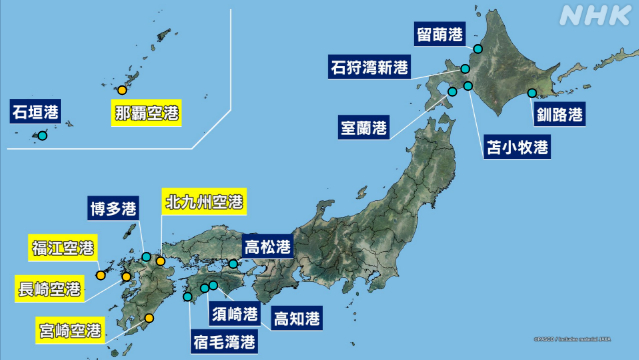In order to strengthen its defense capabilities, the government will designate a total of 16 airports and ports across the country as ``Special Use Airports and Ports,'' which will be developed and expanded so that the Self-Defense Forces and Japan Coast Guard can use them smoothly for training and other purposes. I decided.
In preparation for emergencies, 16 airports and ports nationwide have been designated as “Special Use Airports/Ports”
In preparation for emergencies, the government has designated airports and ports around the country as ``special use airports and ports,'' and plans to develop and expand them so that the Self-Defense Forces and Japan Coast Guard's aircraft and ships can smoothly use them for training and other purposes. We have been considering the designated destination in consultation with the government.
On the 1st, a rotating meeting of the relevant ministers was held and it was decided to designate a total of 16 well-coordinated airports and ports across the country.
There are 5 airports including Naha Airport and 11 ports including Ishigaki Port.
There are five designated airports in Okinawa and Kyushu: Naha Airport, Miyazaki Airport, Nagasaki Airport, Fukue Airport, and Kitakyushu Airport.
The ports are: Ishigaki Port, Hakata Port, Kochi Port, Susaki Port, Sukumo Bay Port, Takamatsu Port, Muroran Port, Kushiro Port, Rumoi Port, Tomakomai Port, Ishikari Bay New Port, Okinawa, There are 11 locations in Kyushu, Shikoku, and Hokkaido.
The government plans to extend the runways and expand the quays as necessary, while maintaining that all airports and ports are primarily for private use.
We also plan to continue coordinating with local governments in order to further designate airports and ports as special use airports and ports.
Expert: “The government should explain the advantages and disadvantages of designation.”
Regarding the government's designation of a total of 16 airports and ports across the country as ``special use airports and ports,'' Shinji Kawana, a professor at Tokyo Institute of Technology who specializes in international politics and security theory, said, ``The risk of emergencies and natural disasters is high. The reason behind the designation is to prepare for the future, and it will create an environment in which the Self-Defense Forces can improve their mobile deployment capabilities and protect citizens.From the government's perspective, it is reasonable."
Regarding the designation of ports not only in Kyushu and Okinawa, but also in Shikoku and Hokkaido, he said, ``Shikoku's ports are characterized by easy access to the Pacific Ocean and easy access from the Nansei Islands.Hokkaido is home to many Ground Self-Defense Force units. It is believed that many ports were designated for transporting goods to the southwest region."
On the other hand, regarding the designated airports and ports, ``It is necessary to clarify rules such as priority of use so as not to hinder civilian use during peacetime.Use by foreign militaries such as the U.S. military is also legally prohibited. It is possible to do so, and in the event of an emergency, it will become the target of an attack, resulting in security risks that have not been seen before.This time, the explanation focuses on disaster response and peacetime use. "However, the government needs to eliminate residents' concerns by clearly explaining the advantages and disadvantages."

